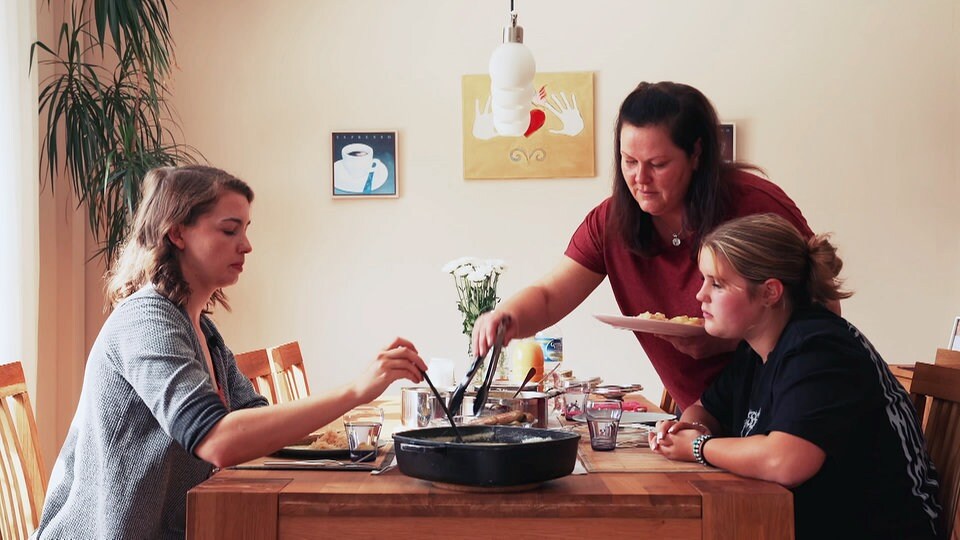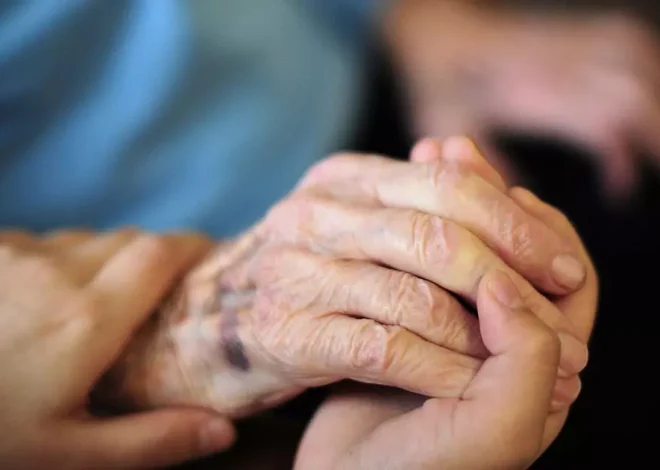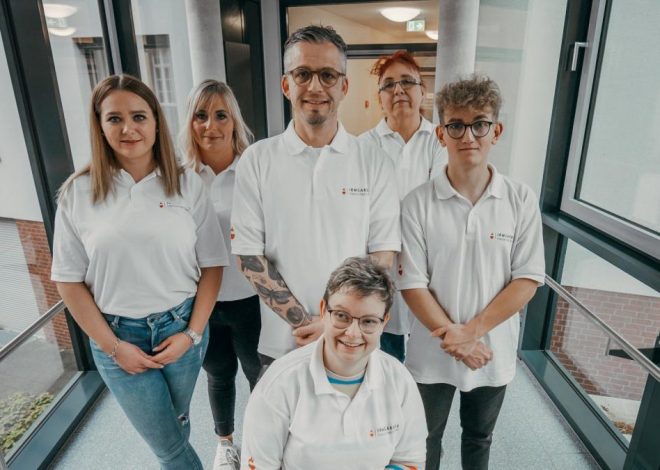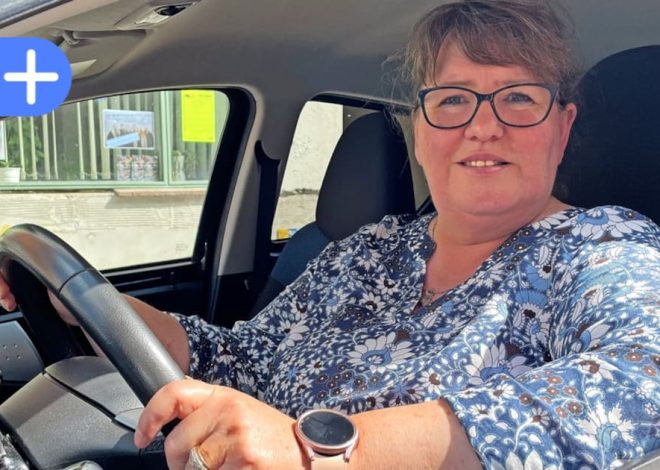
How it affects young people when they have to care for relatives in their youth
They are young and yet have grown up early – children and young people who care for others. Nationwide, on average, up to two students per class care for their sick or disabled family members. In addition to school, they have free time and are growing up. Ronja (13) and Nico (22) were two of them.
When school was over for Ronja M., her day was just beginning. The 13-year-old student from Staßfurt visited her grandmother Hannelore in neighboring Förderstedt after school. Her grandmother had been diagnosed with cancer a few years ago – a shock for the family. Her mother Anja is a geriatric and palliative care nurse and took a break from her job in nursing to look after her grandmother full-time together with Ronja’s uncle.
But everyday life also changed fundamentally for the student: “When I noticed that Grandma was getting sicker and sicker, I hardly went out.” Ronja supported her wherever she could.
Image rights: MDR/ private
It started with cleaning Grandma Hannelore’s house, running errands, doing laundry, shopping, cooking, serving food, personal hygiene. In the last months of Grandma’s life, who was now living with them, the tasks increased. “She left a lot of free time. She is a great child, but she also did it voluntarily. I always said, go as far as you want to go,” says mother Anja. For Ronja the answer was clear – she wanted to be there for her grandma. “Being a child” – she could still do that later.
Almost half a million young people help with care
Ronja is one of around 479,000 young people aged between 12 and 17 who, according to a study by the Center for Quality in Care in Germany, take on care responsibilities and regularly and permanently support their sick parents, grandparents or siblings with household chores, personal hygiene or medical assistance. This means that in every school class there are around one or two students with care responsibilities.
Anyone who becomes ill and in need of care is entitled to benefits from statutory long-term care insurance – some get outpatient care services at home, others go to facilities such as nursing homes, but many are cared for at home by family members. In Saxony-Anhalt, around two out of three people in need of care – around 117,000 people – were cared for exclusively by relatives in 2021.
However, the role of children and young people with sick family members is hardly recorded. According to various estimates, there are between 5,000 and 12,000 so-called young carers in Saxony-Anhalt who (co-)care for their sick or disabled parents, grandparents or siblings. In addition to school, leisure time and growing up.
Image rights: MDR/ David Bochmann
Care first, school later
Nico H., a student from Erfurt, also learned to take on responsibility early on. His mother was diagnosed with breast cancer while he was still at school. Because his father and brother were very busy with their jobs, he took on most of the tasks at home while he was still a student. Once a day, an outpatient nursing service came by for half an hour to care for wounds and change bandages. They did not use any domestic help.
“It would have been more difficult for my brother and my dad to take unpaid leave the whole time. They had to work, too. I could say: school, high school diploma – I’ll do a bit of freestyle,” says Nico. He often used the online lessons during the Corona period to support his sick mother. But even when face-to-face classes resumed, he stayed at home two days a school week to help care for his mother. As a teenager, he often reached his limits: “I wasn’t a doctor, I was often helpless.”
Image rights: MDR/ David Bochmann
Even when Nico gradually built up his own life in Erfurt after the death of his mother, the care he received from his youth continued to accompany him to this day. Through Café B – a contact point for people with disabilities and chronic illnesses as well as those in need of care and their relatives – he offered to help people in need of care in the household alongside his studies. However, when his first care sponsor died, memories of caring for his mother came flooding back and he stopped volunteering.
Young, caring, invisible
Young carers often do not see themselves as such. They lend a hand as a matter of course, partly because of an apparent lack of alternatives, says Mara Rick from the “really irreplaceable” advice service of the Diakonisches Werk Berlin-Stadtmitte. They see the role that children and young people grow up in as normal. That is what makes it so difficult to reach them. Despite this, young people from all over Germany contact her every week, even though the contact point is actually only a Berlin service. Even specialists from the health sector, but also teachers at schools, often do not have the group of young carers in their sights. Mara Rick finds it fatal that there are hardly any direct offers in Germany: “Every year that passes without something being done is a generation lost,” she says.
Image rights: MDR/ David Bochmann
Where young people with sick or disabled family members can get help:
Click here to go to the “Pause Button” project from the Federal Ministry for Family Affairs.
How does Last Aid work? – Click here for the courses.
Helpline for children and young people seeking advice: 116 111 (Monday to Saturday from 2 p.m. to 8 p.m.).
Summary Relief and help for caring relatives.
Citizens’ telephone number for nursing care insurance: 030 – 340 60 66-02
Would you like to offer help in your region?
Registration via the State Coordination Office for Neighbourhood Assistance
The young carers who contact her usually remain anonymous. “Partly because they are afraid of sanctions,” explains Rick. “That means that with young people under 18, the issue is child endangerment. The young people, but also the families, are afraid that the youth welfare office will go into the families and take the young people out.” But this is often unfounded.
Once a young carer, always a young carer?
This makes educational work all the more important. There will always be young carers, says Mara Rick. The question should rather be: “How do we support them?” Initial initiatives such as the online service “Pause Button” founded by the Federal Ministry for Family Affairs, Senior Citizens, Women and Youth in 2017 are a first step.
Although the service is primarily aimed at young carers, it also takes into account professionals from the health and school sectors and the sick person themselves: “An important component of our family-oriented approach to assistance is to support and advise the person in need of care and the caring relatives as best as possible. This also significantly relieves the burden of caring responsibilities on children and young people,” said a spokeswoman for the ministry. When MDR asked how many hits the site had per month and extrapolated over the year, there was no response.
Balancing act between growing up and taking care
Nico says today that he held back in his grief over his mother. Looking back, he would have liked to have had more interaction with like-minded young carers. But otherwise he wouldn’t have done much differently. “It was extremely intense, exhausting and demanding for us as a family, but ultimately also nice because we were able to accompany her and help her. I would do it again,” he says today.
“Young carers take on a lot of responsibility very early on, which also means that on average they are much more empathetic than their peers,” says Mara Rick from the advice center. “They are used to putting themselves in someone else’s shoes. This can also lead to them choosing the social or health sector in their professional life. It is also a treasure that they bring with them from their time as a young carer.” A fact that also applies to Ronja. The 13-year-old wants to become a paramedic when she grows up.
More on the topic of caring relatives
MDR (Michaela Reith, Oliver Leiste)
This topic in the program:MDR TELEVISION | February 28, 2024 | 8:45 p.m.
Show all
Show all

Ethel Purdy – Medical Blogger & Pharmacist
Bridging the world of wellness and science, Ethel Purdy is a professional voice in healthcare with a passion for sharing knowledge. At 36, she stands at the confluence of medical expertise and the written word, holding a pharmacy degree acquired under the rigorous education systems of Germany and Estonia.
Her pursuit of medicine was fueled by a desire to understand the intricacies of human health and to contribute to the community’s understanding of it. Transitioning seamlessly into the realm of blogging, Ethel has found a platform to demystify complex medical concepts for the everyday reader.
Ethel’s commitment to the world of medicine extends beyond her professional life into a personal commitment to health and wellness. Her hobbies reflect this dedication, often involving research on the latest medical advances, participating in wellness communities, and exploring the vast and varied dimensions of health.
Join Ethel as she distills her pharmaceutical knowledge into accessible wisdom, fostering an environment where science meets lifestyle and everyone is invited to learn. Whether you’re looking for insights into the latest health trends or trustworthy medical advice, Ethel’s blog is your gateway to the nexus of healthcare and daily living.



